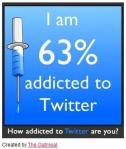 Getting your name into search engines can be extremely beneficial. It’s how employers do more research in potential employees. It’s even a way some people check out people they’re dating.
Getting your name into search engines can be extremely beneficial. It’s how employers do more research in potential employees. It’s even a way some people check out people they’re dating.
When I talk to folks outside of the marketing community, the question of personal brand or reputation comes up frequently. They tell me that they’ve Googled their names to see what comes up. Most of the time, nothing does, or very limited/obscure stuff. If you’re concerned about what’s coming up in search (or not coming up) this post is entirely about getting your name out there, in a positive way.
Here’s what to do:
1. Buy the URL of your name.
This is really easy to do, and it will cost you about $10 a year. Unless you’ve got a popular name, it should still be available. Even if you do have a common name, you can still buy URLs with alternate extensions, like .net or .ca. Here are a list of sites that allow you to search for your URL and buy it:
Netfirms
Network Solutions
Go Daddy
Register.com
2. Create a website
Whether you got your URL or not, you can still get your name up in search rankings if you start a website. Sounds daunting, but it really isn’t. In fact, it’s really easy to do, it’s free and doesn’t require any technical ability whatsoever. Here are a list of free website/hosting sites out there that are extremely useful.
Weebly
Webs
Wix
Jimdo
Synthasite
Once you’ve gotten to one of these sites, you’re probably wondering what the hell to post. All you really need to do, if you want to do the bare minimum, is post one page. If you want your ranking to reflect your career aspirations, then make sure the copy you write sounds like to first paragraph of your resume. If you want it to be personal, then write some copy that’s more personal. It’s also good to write in the third person. It sounds more authoritative in a search result.
3. Get Linkedin
When you Google my name, the first result is my Linkedin profile. If you haven’t heard of Linkedin, it’s the Facebook of the business world. It’s free. It’s also easy to build a profile and, if you want it to, it will automatically search your address book for people you know and can link to.
4. Start a Blog
This is asking for a bit of a commitment, because blogs are time consuming. But really all you need to do is post something once a week. Is that too much to ask for – 200 words a week? Blogs are terrific because they are indexed by both regular search engines and blog search engines. I’d recommend that you register a blog under your name and focus on areas that you know something about. Remember, go back to what you want your search results to say about you. If you want to be seen as an incredible chemical engineer, then probably best to stick that topic instead of why pancakes beat french toast. Here are a list of great, free blog sites:
WordPress
Blogger
Blog
Shoutpost
Typepad
5. Make some comments
Another easy way to get your name out there is to comment on articles and blog posts. Probably the top 25 out of 50 search results that come up for my name are comments I made. For many sites you have to register to leave a comment. Make sure you enter your name for your username, and be smart about your comment. Just because it’s easy to comment doesn’t mean you should be flippant. Whatever your comment is, it will live in search results for a while. And the simple rule is, the more famous the article, the better your comment will do in search rankings.
6. Be a critic
I started a profile on Amazon a while back and made wrote a review on a book called Made to Stick. I’m amazed that the review appears so high in search results. So if you’ve read a book or two, bought a TV, played a game or traveled anywhere, write a review about it on a popular site (Amazon, Best Buy, Tripadvisor, etc.). It will get indexed for search.
7. Be shameless
By now I am sure you’ve heard of Twitter, the microblogging tool that’s taking the geek world by storm. What you’ll notice is that the folks who are really good at getting followers always post helpful links. Do the same. But every once in a while, post a link that goes to your website or blog. If you’ve got something interesting for people to read or see, they’ll follow you. You can also post your blog or web URL when you make comments. If it’s too long, just go to Tinyurl to shorten it. You will also want to ping search engines when you have a new post to your blog. Here are some popular tools:
Feedburner
Pingomatic
Technorati
8. Be consistent
Building your online brand isn’t tough, but it takes consistency to make sure it stays where you want it to be. If you follow all of the previous steps and drop them all a month later, rest assured your search rankings will fall into obscurity. Also, everything is time/date stamped by the search engines. If someone does a search on you and the most recent thing is from 5 years ago, what does that say about you, other than you’ve been living in a unibomber shack in the woods.
Some of these steps will index quicker than others, but rest assured, you’ll see your results change in about 10 days.
Filed under: Branding, Marketing, Social Marketing, Social Networking | Tagged: amazon, best buy, Blogging, Branding, Google, personal brand, SEM, tripadvisor, twitter | Leave a comment »
 If you’re an avid tweeter, you’ve probably been invited to beta test Twitter’s new auto retweet function, which allows you to retweet anything to your followers just with the touch of a button. I like the initiative, but there’s no way it will work. Here’s why:
If you’re an avid tweeter, you’ve probably been invited to beta test Twitter’s new auto retweet function, which allows you to retweet anything to your followers just with the touch of a button. I like the initiative, but there’s no way it will work. Here’s why:

 This is a post for Mr. Over-Tweet. You know who you are, but you probably won’t have time to read this. After all, you’re too busy enthralling us, 140 characters at a time.
This is a post for Mr. Over-Tweet. You know who you are, but you probably won’t have time to read this. After all, you’re too busy enthralling us, 140 characters at a time.  I’m a fan of Hyatt Hotels. In fact one of my favorite hotels is the
I’m a fan of Hyatt Hotels. In fact one of my favorite hotels is the  For those 50% of you who are “Just trying this
For those 50% of you who are “Just trying this  Authenticity is going to be the new battle brands will have on their hands. With the rise of social media and its low barrier to entry, companies that don’t take steps to protect themselves by registering their names on the major sites risk allowing someone else to control their brand name.
Authenticity is going to be the new battle brands will have on their hands. With the rise of social media and its low barrier to entry, companies that don’t take steps to protect themselves by registering their names on the major sites risk allowing someone else to control their brand name. 

 I’ve noticed that the majority of people on
I’ve noticed that the majority of people on  I remember 20-odd years ago when, as an impressionable high schooler, all I wanted was a Bart Simpson “Don’t have a cow, man” t-shirt. Was it because, even early on,
I remember 20-odd years ago when, as an impressionable high schooler, all I wanted was a Bart Simpson “Don’t have a cow, man” t-shirt. Was it because, even early on,